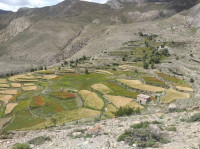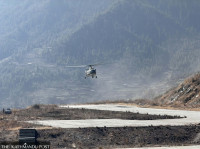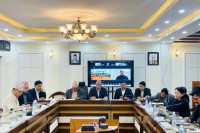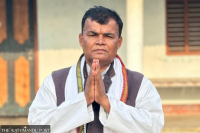National
Power shift at centre, turmoil in provinces
Chief ministers scramble to save positions by expanding Cabinets in a last-ditch effort.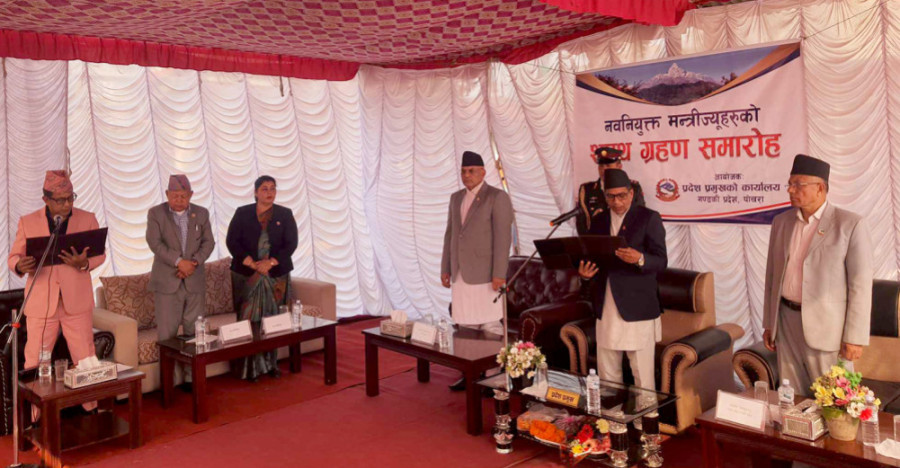
Pratiksha Kafle & Ajit Tiwari
After the formation of five-party federal coalition in Kathmandu, provincial governments have intensified manoeuvres to safeguard their positions, while the opposition political forces are pushing to topple the existing governments and form new ones more favourable to their agenda.
In their last-ditch bid to hold on to power, some provincial executives have expanded their Cabinets. The chief ministers of Gandaki and Sudurpaschim expanded their Cabinets, while the Madhesh chief minister reshuffled his Cabinet to incorporate the new partners of the ruling federal coalition.
Nepali Congress, now the main opposition party in the House of Representatives following the recent shift in political dynamics, currently leads the provincial governments in Koshi, Gandaki, Lumbini and Sudurpaschim provinces, with its members serving as chief ministers. Likewise, the CPN (Maoist Centre) is at the helm in Bagmati and Karnali provinces. Similarly, the coalition government in Madhesh is led by the Janata Samajbadi Party.
In Gandaki, in an apparent bid to safeguard his government, Chief Minister Surendra Raj Pandey expanded his Cabinet to induct gangster-turned-politician Rajeev Gurung, also known as Deepak Manange, into the Gandaki provincial government on Monday.
Pandey appointed Gurung as the Minister for Physical Infrastructure Development and Transport Management. Province Head Dilli Raj Bhatta administered the oath of office and secrecy to the newly appointed minister.
Before joining the provincial government, Manange had earlier on Monday announced that he was quitting the CPN (Unified Socialist). Minister for Agriculture and Land Management Mahendra Dhwaj GC has been assigned additional responsibility of the Ministry of Social Development and Health as well.
Gurung, who was elected as an independent candidate unopposed as a provincial assembly member from Manang (B), had later joined the Unified Socialist in December 2022. It’s Manange’s fourth stint as a minister.
The Congress-led government in Gandaki has been rendered a minority after the Maoist Centre pulled out following the change in the federal coalition earlier this month. The Congress holds the largest share in the 60-seat assembly with 27 members, followed by UML with 22, CPN (Maoist Centre) with eight members including the Speaker, while the Rastriya Prajatantra Party has two members in the assembly. The chief minister now requires the backing of three more assembly members to regain a majority.
Similarly, Madhesh Province Chief Minister Saroj Kumar Yadav on Monday reshuffled his Cabinet, dismissing three Congress ministers and inducting a minister from the UML.
Yadav inducted UML provincial assembly member Saroj Kumar Yadav (who shares a name with the chief minister) to the Cabinet as the minister for Physical Infrastructure and Development. New minister Yadav took oath of office and secrecy from Province Head Sumitra Subedi Bhandari.
According to Sitaram Agrahari, press adviser to Chief Minister Yadav, three Congress ministers were relieved of their responsibilities automatically as a result of the changes in the Cabinet.
The chief minister has kept education and culture; health and population; internal affairs, communications, and law; and labour and transport portfolios with himself.
Congress provincial assembly leader Krishna Prasad Yadav was Minister for Physical Infrastructure and Development in the Yadav-led government. Likewise, Congress’ Birendra Prasad Singh was in charge of the Ministry of Health and Population while Mohammad Samim was the Minister for Home Affairs, Communications and Law.
Despite the change in the Madhesh Cabinet, the Congress ministers have adamantly refused to vacate their positions asserting that they dare the chief minister to officially sack them.
The 107-strong provincial assembly has 23 lawmakers from the UML; 22 from the Congress; 18 from the Janata Samajbadi Party; 13 from the Janamat Party; nine each from the Loktantrik Samajbadi Party, the Maoist Centre and the Unified Socialist; one each from the Nagarik Unmukti Party, Rastriya Prajatantra Party and Nepal Sanghiya Samajbadi Party, plus one independent member.
Assembly member Abhiram Sharma of the Loktantrik Samajbadi Party was suspended after the Mahottarai District Court handed him a life term.
On February 18, Yadav, who represents the Janata Samajbadi Party (JSP), secured a vote of confidence from the provincial assembly for the third time. Yadav had gone for the floor test after the CK Raut-led Janamat Party withdrew its support to the government and recalled its two provincial ministers on January 23, accusing the chief minister of running the provincial government unilaterally.
In Sudurpaschim Province, Chief Minister Kamal Bahadur Shah expanded his Cabinet twice in a matter of three days last week. He inducted four ministers from the Nagarik Unmukti Party, which was formed by Resham Lal Chaudhary, amid a dispute within the party. Chief Minister Shah’s ruling coalition relies on the Nagarik Unmukti Party, Rastriya Prajatantra Party and an independent member of the provincial assembly.
On Sunday, the Nagarik Unmukti Party decided to support the provincial government led by Congress lawmaker Kamal Bahadur Shah in the Sudurpaschim Province. The provincial assembly party meeting of the Nagarik Unmukti Party decided to continue its support to the Shah-led government despite a change in the federal coalition. However, two of the party provincial assembly members are against the party’s decision.




 25.42°C Kathmandu
25.42°C Kathmandu.jpg)

